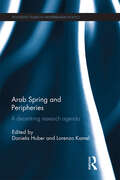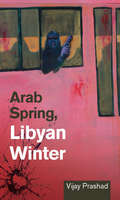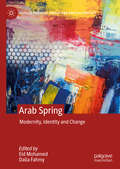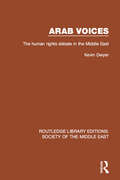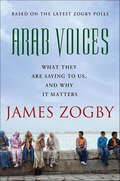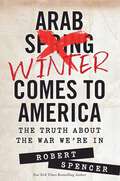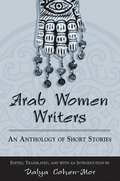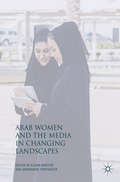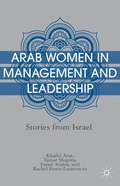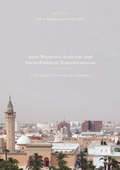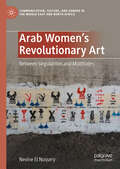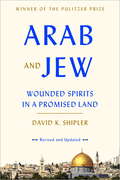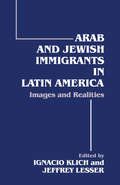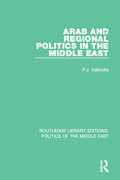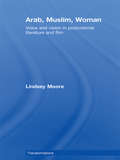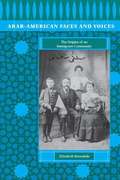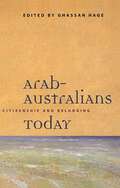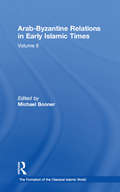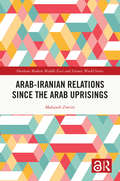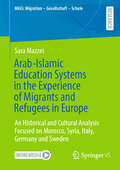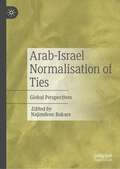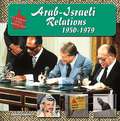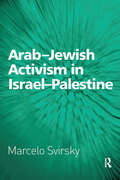- Table View
- List View
Arab Spring and Peripheries: A Decentring Research Agenda (Routledge Studies in Mediterranean Politics)
by Daniela Huber and Lorenzo KamelThe emerging literature on the so-called ‘Arab Spring’ has largely focused on the evolution of the uprisings in cities and power centres. In order to reach a more diversified and inner understanding of the ‘Arab Spring’, this edited book examines how peripheries have reacted and contributed to the historical dynamics at work in the Middle East and North Africa. It rejects the idea that the ‘Arab Spring’ is a unitary process and shows that it consists of diverse Springs which differed in terms of opportunity structure, strategies of a variance of actors, and outcomes. This book looks at geographical, religious, gender and ethnical peripheries, conceptualizing periphery as a dynamic structure which can expand and contract. It shows that the seeds for changing the face of politics and polities are within peripheries themselves. Focusing on the voices of peripheries can therefore be a powerful tool to ‘de-simplify’ the reading of the Arab Spring and to reshape the paradigmatic schemes through which to look at this part of the world.This book was published as a special issue of Mediterranean Politics.
Arab Spring, Libyan Winter
by Vijay PrashadThe Arab Spring captivated the planet. Mass action overthrew Tunisia's Ben Ali and Egypt's Hosni Mubarak. The revolutionary wave spread to the far corners of the Arab world, from Morocco to Bahrain. It seemed as if all the authoritarian states would finally be freed, even those of the Arabian Peninsula. People's power had produced this wave, and continued to ride it out. In Libya, though, the new world order had different ideas. Social forces opposed to Muammar Qaddafi had begun to rebel, but they were weak. In came the French and the United States, with promises of glory. A deal followed with the Saudis, who then sent in their own forces to cut down the Bahraini revolution, and NATO began its assault, ushering in a Libyan Winter that cast its shadow over the Arab Spring. This brief, timely analysis situates the assault on Libya in the context of the winds of revolt that swept through the Middle East in the Spring of 2011. Vijay Prashad explores the recent history of the Qaddafi regime, the social forces who opposed him, and the role of the United Nations, NATO, and the rest of the world's superpowers in the bloody civil war that ensued. Vijay Prashad is the George and Martha Kellner Chair of South Asian History, and professor and director of international studies at Trinity College in Hartford, Connecticut. He is the author or editor of over a dozen books, including Karma of Brown Folk and, most recently, The Darker Nations: A People's History of the Third World.
Arab Spring: Modernity, Identity and Change (Critical Political Theory and Radical Practice)
by Eid Mohamed Dalia FahmyThis book provides systematic, integrated analyses of emergent social and cultural dynamics in the wake of the so-called Arab Spring, and looks closely at the narratives and experiences of a people as they confront crisis during a critical moment of transition. Providing an interdisciplinary approach to interconnections across regional and communal boundaries, this volume situates itself at the intersection of political science, cultural studies, media and film studies, and Middle Eastern studies, while offering some key critical revisions to dominant approaches in social and political theory. Through the unique contributions of each of its authors, this book will offer a much-needed addition to the study of Middle East politics and the Arab Spring. Moreover, although its specific focus is on the Arab context, its analysis will be of issues of significant relevance to a changing world order.
Arab Voices: The human rights debate in the Middle East (Routledge Library Editions: Society of the Middle East #4)
by Kevin DwyerThis book, first published in 1991, moves beyond sensational headlines to explore how Middle Eastern men and women speak and feel about the societies in which they live. Kevin Dwyer makes use of extensive research and interview material from Egypt, Tunisia and Morocco and combines first-hand testimony with vivid and illuminating analysis. The voices are those of lawyers, political militants, religious thinkers, journalists and human rights activists who focus their discussion on the question of human rights and critical issues in social and cultural life.
Arab Voices: What They Are Saying to Us, and Why it Matters
by James ZogbyThe Arab World is a region that has been vastly misunderstood in the West. Arab Voices asks the questions, collects the answers, and shares the results that will help us see Arabs clearly. The book will bring into stark relief the myths, assumptions, and biases that hold us back from understanding this important people. Here, James Zogby debuts a brand new, comprehensive poll, bringing numbers to life so that we can base policy and perception on the real world, rather than on a conjured reality.Based on a new poll run by Zogby International exclusively for this book, some of the surprising results revealed include:* Despite the frustration with the peace process and the number of wars of the past few years, 74% of Arabs still support a two state solution to the Palestinian-Israeli conflict. And over one-third of Lebanese, Saudis, and Jordanians think that their governments should do more to advance peace.* Despite wars in and around their region and the worldwide economic crisis, when asked "Are you better off than you were 4 years ago?" 42% of those polled say they are better off, 19% worse off.* Arabs like American people (59% favorable rating), values (52%) and products (69%), giving them all high ratings. And Canada gets high favorability ratings everywhere (an overall rating of 55% favorable and 32% unfavorable).* However, Arabs overwhelmingly rate American society "more violent and war-like" (77%) or "less respectful of the rights ofothers" (78%) than their own society. Why? Because of the Iraq war and continuing fallout from Abu Ghraib,Guantanamo, and the treatment of Arab and Muslim immigrants and visitors to the United States.* What type of TV show do Saudis and Egyptians prefer to watch? The answer is, "Movies", which draws over 50% of the first and second choice votes. In Morocco, the top rated shows are "soap operas" and music and entertainment programs, drawing almost two-thirds of the first and second choice votes. Religious programs are near the bottom of the list of viewer preferences, garnering less than 10% of votes in all three countries.
Arab Water Security
by Hussein A. AmeryThis book explores the national security implications of the Arab Gulf states' reliance on desalination plants, and their related infrastructure. It provides the first systematic and comprehensive discussion of current and future threats to the supply of freshwater from a desalination plant, including actual and virtual attacks by terrorists, mechanical failure, contamination, sabotage by aggrieved workers, attacks relating to regional conflicts, as well as their vulnerability to natural disasters. It also provides a detailed analysis of the effects of a potential disruption to the water supply, and proposes possible measures, both political and technological, that can be used to increase resilience to these threats. Arab Water Security is a valuable reference for researchers and graduate students, as well as for policy makers and professionals, interested in water security, natural resources, and environmental terrorism.
Arab Winter Comes to America: The Truth About the War We're In
by Robert SpencerOverlooked by our media, purposely obscured by our own government, and unnoticed by the vast majority of Americans, the turmoil of the Islamic world's "Arab Spring" has become an "Arab Winter," bringing new threats of terror to America. New York Times bestselling author Robert Spencer, an expert on Islam and terrorism, reveals why America is shockingly unequipped to face this threat. In Arab Winter Comes to America: The Truth about the War We're In, you'll learn why the Obama administration has opted to appease rather than confront Islamic extremists in the United States; how Muslim organizations are pressuring witnesses to terror crimes not to cooperate with authorities; why the Justice Department has buried select news stories; and much, much more.The "Arab Spring" uncorked a jihadist genie in North Africa and the Middle East. It is about to wreak its mayhem here, with renewed terrorism. Americans need to inform themselves of the threat-and ensure that their elected government in Washington takes action. Robert Spencer's Arab Winter Comes to America sounds the alarm and shows what needs to be done. It is essential reading.
Arab Women Writers: An Anthology of Short Stories (SUNY series, Women Writers in Translation)
by Dalya Cohen-MorConsisting of sixty short stories by forty women writers from across the Arab world, this collection opens numerous windows onto Arab culture and society and offers keen insights into what Arab women feel and think. The stories deal not only with feminist issues but also with topics of a social, cultural, and political nature. Different styles and modes of writing are represented, along with a diversity of techniques and creative approaches, and the authors present many points of view and various ways of solving problems and confronting situations in everyday life. Lively, outspoken, and provocative, these stories are essential reading for anyone interested in the Arab world.
Arab Women and the Media in Changing Landscapes
by Elena Maestri Annemarie ProfanterThis volume explores the dialogue between Arab media and global developments in the information age, looking at the influence of new technologies in Arab societies and the evolving role of Arab women in 'old' and 'new' media. By gathering together contributions from both Arab and non-Arab scholars alike, a timely and important collection is presented that sheds new light on the growing involvement, role and image of Arab women in the media.
Arab Women in Management and Leadership
by Khalid ArarAn exploration of the life-stories of 22 pioneer Arab women who have forged their path to management and leadership in education and welfare, overcoming challenges imposed by a patriarchal society that sees female leadership as a threat.
Arab Women's Activism and Socio-Political Transformation: Unfinished Gendered Revolutions
by Sahar Khamis Amel MiliThis book illustrates how Arab women have been engaging in three ongoing, parallel struggles, before, during, and after the Arab Spring, on three levels, namely: the political struggle to pave the road for democracy, freedom, and reform; the social struggle to achieve gender equality and fight all forms of injustice and discrimination against women; and the legal struggle to chart new laws which can safeguard both the political and the social gains. The contributors argue that while the political upheavals were oftentimes more prevalent and visible, they should not overshadow the parallel social and legal revolutions which are equally important, due to their long-term impacts on the region. The chapters shed light on the intersections, overlaps and divergences between these simultaneous, continuous gendered struggles and unpacks their complexities and multiple implications, locally, regionally, and internationally, across different countries and through different phases.
Arab Women's Revolutionary Art: Between Singularities and Multitudes (Communication, Culture, and Gender in the Middle East and North Africa)
by Nevine El NosseryThis book examines the ways in which women in the contemporary Middle East and North Africa have re-imagined revolutionary discourses through creativity and collective action as a means of resistance. Encompassing a stunning array of forms and genres, such as graffiti, street performance, photography, phototexts, novels, and comics, the book draws from a vast spectrum of artistic production in revolutionary periods between 2011 and 2022 in Egypt, Tunisia, Morocco, and Algeria. El Nossery sheds light on women’s postrevolutionary artistic output by engaging an interdisciplinary approach: the book is divided into three sections which foreground the unique relationship between textual, visual, and performative modes as they intertwine with art and politics. Arab Women’s Revolutionary Art thereby aims to demonstrate how art, as always oriented towards an open future, can preserve the revolutionary spirit that was sparked in 2011 by documenting what happened and determining which stories would be told. The revolution, therefore, continues.
Arab and Jew: Wounded Spirits in a Promised Land
by David K. ShiplerThe expanded and updated edition of David Shipler's book that examines the relationship, past and present, between Arabs and Jews<P><P> In this monumental work, extensively researched and more relevant than ever, David Shipler delves into the origins of the prejudices that exist between Jews and Arabs that have been intensified by war, terrorism, and nationalism.<P> Focusing on the diverse cultures that exist side by side in Israel and Israeli-controlled territories, Shipler examines the process of indoctrination that begins in schools; he discusses the far-ranging effects of socioeconomic differences, historical conflicts between Islam and Judaism, attitudes about the Holocaust, and much more. And he writes of the people: the Arab woman in love with a Jew, the retired Israeli military officer, the Palestinian guerrilla, the handsome actor whose father is Arab and whose mother is Jewish.<P> For Shipler, and for all who read this book, their stories and hundreds of others reflect not only the reality of "wounded spirits" but also a glimmer of hope for eventual coexistence in the Promised Land.<P> Pulitzer Prize winner
Arab and Jewish Immigrants in Latin America: Images and Realities
by Jeffrey Lesser Ignacio KlichThis collection of essays addresses various aspects of Arab and Jewish immigration and acculturation in Latin America. The volume examines how the Latin American elites who were keen to change their countries' ethnic mix felt threatened by the arrival of Arabs and Jews.
Arab and Regional Politics in the Middle East (Routledge Library Editions: Politics of the Middle East #1)
by P.J. VatikiotisThree main themes are explored in this book, first published in 1984: the first is the problem of religion and politics as a major and long-standing preoccupation of Middle-easterners or Arab Muslims themselves; the second is that of the conflict-ridden inter-Arab and regional politics, approached largely from a local rather than an international perspective; the third deals with Egypt. The book also enquires into the nature of rule and regimes in the Middle East, the basis of authority and the arrangements for the organisation, exercise and use of power. Drawing examples from Egypt and the Fertile Crescent, the emphasis is on the relation between tradition and politics, historical evolution and state policy, domestic factors and external constraints.
Arab, Muslim, Woman: Voice and Vision in Postcolonial Literature and Film (Transformations)
by Lindsey MooreGiven a long history of representation by others, what themes and techniques do Arab Muslim women writers, filmmakers and visual artists foreground in their presentation of postcolonial experience? Lindsey Moore’s groundbreaking book demonstrates ways in which women appropriate textual and visual modes of representation, often in cross-fertilizing ways, in challenges to Orientalist/colonialist, nationalist, Islamist, and ‘multicultural’ paradigms. She provides an accessible but theoretically-informed analysis by foregrounding tropes of vision, visibility and voice; post-nationalist melancholia and mother/daughter narratives; transformations of ‘homes and harems’; and border crossings in time, space, language, and media. In doing so, Moore moves beyond notions of speaking or looking ‘back’ to encompass a diverse feminist poetics and politics and to emphasize ethical forms of representation and reception. Aran, Muslim, Woman is distinctive in the eclectic body of work that it brings together. Discussing Algeria, Egypt, Jordan, Lebanon, Morocco, the Palestinian territories, and Tunisia, as well as postcolonial Europe, Moore argues for better integration of Arab Muslim contexts in the postcolonial canon. In a book for readers interested in women's studies, history, literature, and visual media, we encounter work by Assia Djebar, Mona Hatoum, Fatima Mernissi, Ahlam Mosteghanemi, Nawal el Saadawi, Leila Sebbar, Zineb Sedira, Ahdaf Soueif, Moufida Tlatli, Fadwa Tuqan, and many other women.
Arab-American Faces and Voices: The Origins of an Immigrant Community
by Elizabeth BoosahdaIn this book, Elizabeth Boosahda, a third-generation Arab American, draws on over two hundred personal interviews, as well as photographs and historical documents that are contemporaneous with the first generation of Arab Americans (Syrians, Lebanese, Palestinians), both Christians and Muslims, who immigrated to the Americas between 1880 and 1915, and their descendants.Boosahda focuses on the Arab-American community in Worcester, Massachusetts, a major northeastern center for Arab immigration, and Worcester's links to and similarities with Arab-American communities throughout North and South America.
Arab-Australians Today: Citizenship and Belonging
by Ghassan HageArab people first came to Australia in the late nineteenth century. Today more than half a million Australians claim some form of Arab ancestry.They are a diverse group, both socially and economically. New South Wales, for example, appointed Australia's first Lebanese Governor, while at the same time it was labelling groups of economically deprived young people as 'Lebanese gangs'. Victoria's Premier, Steve Bracks, comes from a Lebanese background. Melbourne has an important Arab business community, while newly arrived Arab immigrants have one of the highest rates of unemployment in the country.Arab-Australians Today raises important questions about immigration, settlement, marginalisation and participation in Western societies. It discusses the way early Arab immigrants were received in Australia and talks about contemporary issues of participation in the Australian political process. It examines the lives of diverse groups of people, ranging from entrepreneurs to Arab women activists to unemployed youth. It analyses issues ranging from the ways Arab-Australians grow to call Australia home, to the moral panic created around Arab youth and criminality.The book offers non-Arab-Australians a way to better understand the Arab presence in Australia. It is also an invitation for Arab-Australians to reflect on the history of their settlement in Australia, as well as on the current experience of more recent immigrants.
Arab-Byzantine Relations in Early Islamic Times (The Formation of the Classical Islamic World #8)
by Michael BonnerThe Byzantine Empire was the Islamic commonwealth’s first and most stubborn adversary. For many centuries it loomed large in Islamic diplomacy, military operations and commerce, as well as in Islamic representations of the world in general. Moreover, the ways in which early Muslims and Byzantines perceived one another ” both polemically and otherwise ” afterwards proved decisive for the mutual perceptions between the Islamic world and Christian Western Europe. For these and other reasons, Arab-Byzantine relations have been a major concern of modern scholarship on early Islam for well over a century. Arab-Byzantine Relations in Early Islamic Times presents some of the most important of these contributions, organized according to the following themes: war and diplomacy; frontiers and military organization; polemics and images of the 'other'; exchange, influence and convergence; and martyrdom, jihad and holy war. An introductory essay discusses these themes within the contexts of early Islamic society, politics and economy.
Arab-Iranian Relations Since the Arab Uprisings (Durham Modern Middle East and Islamic World Series)
by Mahjoob ZweiriUnlike most writing on Arab-Iran relations, which looks at specific episodes and specific countries, this book, taking a long term view, assesses the overall dynamics of the relationship, discussing in particular how far religion or politics drives the relationship. It argues that although Iran asserts that religion is a key factor underpinning a coherent approach to international relations, in fact what turns out to be the key factor is the politics of particular circumstances and Iran’s specific interests. The book considers Iran’s differing reactions to the Arab uprisings of 2011 onwards, showing that while Iran supported the uprisings in some countries it sided with repressive governments in other countries. The book also examines Iran’s reaction to its own outbreak of popular discontent in 2009 which was controlled by what has been considered as severe repression and explores how Iran is viewed by ordinary people in different Arab countries.
Arab-Iranian Relations Since the Arab Uprisings (Durham Modern Middle East and Islamic World Series)
by Mahjoob ZweiriUnlike most writing on Arab-Iran relations, which looks at specific episodes and specific countries, this book, taking a long term view, assesses the overall dynamics of the relationship, discussing in particular how far religion or politics drives the relationship. It argues that although Iran asserts that religion is a key factor underpinning a coherent approach to international relations, in fact what turns out to be the key factor is the politics of particular circumstances and Iran’s specific interests. The book considers Iran’s differing reactions to the Arab uprisings of 2011 onwards, showing that while Iran supported the uprisings in some countries it sided with repressive governments in other countries. The book also examines Iran’s reaction to its own outbreak of popular discontent in 2009 which was controlled by what has been considered as severe repression and explores how Iran is viewed by ordinary people in different Arab countries.Chapter 1 of this book is freely available as a downloadable Open Access PDF at http://www.taylorfrancis.com under a Creative Commons Attribution-Non Commercial-No Derivatives (CC-BY-NC-ND) 4.0 license.
Arab-Islamic Education Systems in the Experience of Migrants and Refugees in Europe: An Historical and Cultural Analysis Focused on Morocco, Syria, Italy, Germany and Sweden (MiGS: Migration - Gesellschaft - Schule)
by Sara MazzeiIn the last decade, Europe has welcomed numerous migrants and refugees from Arab countries. Their scholastic inclusion has been challenging, and the teaching staff had to sometimes deal with unfamiliar realities. The issue has been addressed by various perspectives, from sociology to psychology, insights from which are gathered in intercultural education. In it, there are scarcity of studies that delve into pupils&’ cultural backgrounds, and countries of origin&’s history is seldom regarded as a decisive factor in the formation of identity. Among Arabic-speaking communities the Moroccan and Syrian ones are the most significant and Morocco and Syria have interesting histories and education systems. Using Nussbaum's (2010) multifactorial analysis, this research aims to better understand the educational universe where Arabic-speaking pupils come from, focusing on humanities and religious education in the experience of pupils, especially from Morocco and Syria. Methodology comprehends qualitative empirical research conducted in Europe. Results show the differences experienced by pupils in their educational paths among diverse Arab and European countries and the more sensitive topics they encounter in their education in Europe in relation to their identity.
Arab-Israel Normalisation of Ties: Global Perspectives
by Najimdeen BakareThis book focuses on rapprochement and normalisation between Israel and some Arab countries within the context of global and regional geopolitics, bringing together broader perspectives on transformations resulting from this. The analysis is rooted in a historical and cultural construction of the region as an Islamic sphere viewing Israel as a perpetuation of the Western colonial project in the region. It analyses how this normalisation must not be treated as a novel phenomenon, but as a reconstruction of the past and continuity in tradition geared at regional stability, signifying a wider shift in the structure of the global international system. The first section addresses the international perspectives of the changing dynamics through the lens of US domestic politics, disengagement plans, China’s increasing understanding of the geopolitics of the Abrahamic world. It equally pays enough attention to the attendant implications of this normalisation. The second section of the book explores the reflections of regional (state and non-state) actors, such as Turkey, Iran, Syria, Pakistan, and Hezbollah, and the catalysing effects of this normalisation within and beyond the region. The book is a rich resource for scholars of regional and international relations, in particular Middle East studies. It provides useful reading material for both undergraduate and graduate students of Political Science, think tanks, diplomats, and IR experts and policy analysts, who are desirous of having rich theoretical and empirical underpinnings of unfolding realities in the larger Middle East.
Arab-Israeli Relations, 1950-1979
by Brian BaughanArab-Israeli Relations, 1950-1979 examines the history of relations between Israel and its Arab neighbors, discussing such important events as the 1956 Suez Canal crisis, the June 1967 War, and the 1978 Camp David Accords.
Arab-Jewish Activism in Israel-Palestine
by Marcelo SvirskyApplying the insights of Deleuze and Guattari's works to Israel-Palestine, Arab-Jewish Activism in Israel-Palestine sets out to re-conceptualise the relationship between resistance and power in ethnically segregated spaces in general, and the Israeli-Palestine context in particular. Combining many years of ethnographic study and political and social activism with a solid, theoretical, conceptual framework, Marcelo Svirsky convincingly argues that successful efforts to decolonise the region depend on taking the struggle beyond self-determination and making it collaborative. Decolonisation depends on political and cultural changes that elaborate on the historical partition of social life in the region that have been an issue since the early twentieth century. This elaboration means producing a civil struggle aimed at the destabilisation of the Zionist supremacy and resulting in a democratic, political community from the Mediterranean Sea to the Jordan River. Simply not just another book on Israel and Palestine, Arab-Jewish Activism in Israel-Palestine provides refreshingly new empirical evidence and theoretical analysis on the connection between resistance, intercultural alliances, civil society, and the potential for actualising shared sociabilities in a conflict-ridden society. An indispensable read to all scholars wishing to gain original insights into the transversal connections which transcend ethnicity.
